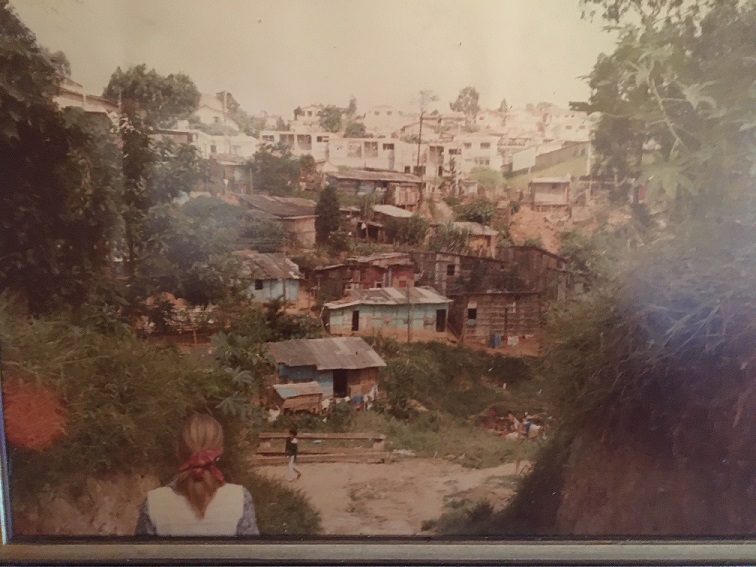When a human being enters upon earthly life he delivers himself up completely, with all his senses and feelings. For the child the world is good, therefore it imitates everything in its surroundings. Later, at around six or seven years of age, the child acquires a certain independence, but even then it perceives the world through the deeds, feelings and thoughts of its educators. They are the bridge which unites the child to the world and through them it perceives what is good or evil, beautiful or ugly, true or false. It is only during adolescence that the human being begins to look at the world critically, searching for an ideal, a meaning to life.
The question arises: And in a Brasilian favela? How are these laws of development affected under such adverse conditions? The laws of development are universal, but the environment affects the individual in different ways, favoring or impeding his development.
A child like Divino, born in a favela, is deeply marked by his environment and conditions of life. When a child is born in a favela the mother, sisters and brothers, the whole family is happy and a climate of love reigns around the newly-born. It is received just as any child is, regardless of social class. After a few days, however (and this is one of the most painful phenomena we meet in the favela), that same child has already been marked by the scars of poverty: dysentery, skin lesions, fever or potentially fatal illnesses such as dehydration or pneumonia. Nutrition is deficient, especially if the mother is not able to nurse the child, sense impressions are deplorable: noisy, ugly huts, always humid and very hot in summer, "decorated" with pages torn from magazines.
When the child is still very small it doesn't differentiate his surroundings from himself. He assimilates all these impressions, and these form the "instrument" through which he will act, feel and think in life. It is important to emphasize that all the child's organs, especially the brain, are formed during this phase and that this formation is deficient in the case of favela children due to the conditions mentioned. This is one of the main causes of poor performance in school and not, as is often said, stupidity or laziness.
At the age of seven, totally unprepared, the child goes to school with the joyful expectation of finding something important for his or her life. For the majority however, school life becomes a burden. Aside from not having anyone at home to help, the teaching does not relate to his external life, not to mention his internal life. The child is forced to pass through an arid desert of facts without meaning for him and lacking a loved person whom he can respect and can give him the chance to discover the world's beauty, as well as educate him by means of art, crafts and religion.
Soon the child leaves school and begins to work. He is transformed into a miniature adult, submerged in the ferocious battle for survival. His natural development is interrupted, his childhood sacrificed. In becoming a precocious adult, he skips over an important phase of development.
Overburdened by their lives, adolescents frequently feel that the moment of freedom has arrived. The more burdensome life is, the more quickly they fall into the first passion. Universal love is reduced to sexual desire, babies come almost immediately, very early and "by accident".
An adolescent who lives in a favela rarely finds the opportunity to find ideals or a profession which corresponds to his personality. Therefore he idolizes anyone "different" or "modern" whom he meets or sees on television. Aside from the singers on television, the idols of the favelas are the drug dealers and the gangsters. Usually the first work by which some money can be earned is immediately accepted. In truth, it is the labor market which determines the occupation and not the individual's aptitudes and wishes.
It seems to be a no-win situation. In fact, the obstacles to a healthy, creative and integrated life are immense. We could easily make the mistake of thinking that it is a vicious circle and that it isn't worthwhile trying to do something about it:
deficient nutrition > lack of stimulation > poor schools > low pay > no trade.
However, this vicious circle can be broken by two forces: The individual's Self (incarnated in a favela) and love for the other.
It is truly painful to experience the deep wounds which the hard life in a favela leaves on human beings. On the other hand, it is gratifying to see how many are able to retain their dignity under the worst conditions, keeping their spiritual flame burning. Many are able to learn a trade and leave the favela.
The second force is neighborly love, or, to avoid an over-used expression, a deep interest in the developing human being; also the firm conviction that there is potential for growth in every individual.
Every seed requires fertile soil, air, water and sun in order to unfold. The human being needs love and trust in order to awaken. Just as a seed can rarely break through a layer of cement and grow without water and sunlight, it is also very rare that a human being is able to lift himself up alone. Every human being needs help to grow and develop - especially those who are born in an infertile soil, with their air and water polluted and a "spiritual sun" which shines with difficulty through the obstacles imposed by life in the favela.
The social work we are doing in the favelas of Brasil is an attempt to help each human being to live.

